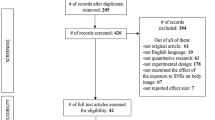Abstract
To date, there has been very little empirical research examining why people gamble online or—just as importantly—why they do not gamble online. A grounded theory study examining the motivating and inhibiting factors in online gambling was carried out. The sample comprised 15 online gamblers, 14 offline gamblers, and 11 non-gamblers, and resulted in the identification of one major theme as to why participants were motivated to gamble online (i.e., greater opportunity to gamble) and four sub-themes (i.e., convenience, value for money, the greater variety of games, and anonymity). The main reason that inhibited online gambling was that the authenticity of gambling was reduced when gambling online. Four further sub-themes were identified as inhibitors of online gambling (i.e., the reduced realism, the asocial nature of the internet, the use of electronic money, and concerns about the safety of online gambling websites). Results also indicated that the participants’ perception was that online gambling was more addictive than offline gambling and that online gambling would exacerbate gambling problems in society.

Similar content being viewed by others
References
Abbott, M. W., Williams, M. M., & Volberg, R. A. (2004). A prospective study of problem and regular non problem gamblers living in the community. Substance Use and Misuse, 39, 855–884.
American Psychiatric Association. (1994). Diagnostic and statistical manual of mental disorders (4th ed.). Washington: Author.
Ferris, J., & Wynne, H. (2001). The Canadian problem gambling index: Final report. Ottawa: Canadian Centre on Substance Abuse.
Gambling Commission (2010). Survey data on gambling participation—April 2010. Located at: http://www.gamblingcommission.gov.uk/research__consultations/research/survey_data_on_remote_gam/survey_data_on_remote_gambling.aspx. (Last accessed June 19 2010).
GamCare (2006). Care Services 2006 Report. Located at: http://www.gamcare.org.uk/data/files/pdfs/CareServices2006.pdf. (Last accessed June 19 2010).
Golder, S. A., & Donath, J. (2004). Hiding and revealing in online poker games. Proceedings of the ACM conference on computer-supported cooperative work (pp. 370–373). New York: ACM Press.
Griffiths, M. D. (1995). Adolescent gambling. London: Routledge.
Griffiths, M. D. (1999). Gambling technologies: prospects for problem gamblers. Journal of Gambling Studies, 15, 265–283.
Griffiths, M. D. (2001). Internet gambling: Preliminary results of the first UK prevalence survey. Journal of Gambling Issues, 5, Located at: http://www.camh.net/egambling/issue5/research/griffiths_article.html. (Last accessed June 19 2010).
Griffiths, M. (2003). Internet gambling: issues, concerns and recommendations. CyberPsychology and Behavior, 6, 557–568.
Griffiths, M. D. (2006a). Addiction trends: internet v casino gambling. Casino and Gaming International, 2(1), 85–91.
Griffiths, M. (2006b). Internet trends, projections & effects: what can looking at the past tell us about the future. Casino and Gaming International, 4, 37–43.
Griffiths, M. D., & Barnes, A. (2008). Internet gambling: an online empirical study among student gamblers. International Journal of Mental Health and Addiction, 6, 194–204.
Griffiths, M., & Parke, J. (2007). Betting on the couch: a thematic analysis of internet gambling using case studies. Social Psychological Review, 9(2), 29–35.
Griffiths, M., Parke, A., Wood, R., & Parke, J. (2006). Internet gambling: an overview of psychosocial impacts. Gaming Research and Review Journal, 27(1), 27–39.
Griffiths, M., Wardle, H., Orford, J., Sproston, K., & Erens, B. (2009). Sociodemographic correlates of internet gambling: findings from the 2007 British Gambling Prevalence Survey. CyberPsychology and Behavior, 12, 199–202.
Henn, M., Weinstein, M., & Foard, N. (2009). A critical introduction to social research, 2nd ed. Sage Publications.
Ialomiteanu, A., & Adlaf, E. M. (2001). Internet gambling among Ontario adults. Journal of Gambling Issues, 5, Located at: http://www.camh.net/egambling/issue5/research/ialomiteanur_adlaf_article.html. (Last accessed June 19 2010).
Ipsos Reid (2005). Online Poker in North America: A syndicated study. Located at: http://www.ipsos.ca/pdf/Ipsos_OnlinePoker.pdf. (Last accessed June 19 2010).
Jacques, C., Ladouceur, R., & Ferland, F. (2000). The impact of availability on gambling: a longitudinal study. Canadian Journal of Psychiatry, 45, 810–815.
Kassinove, J. I., Tsytsarev, S. V., & Davidson, I. (1998). Russian attitudes toward gambling. Personality and Individual Differences, 24, 41–46.
Lapuz, J. & Griffiths, M. D. (2010). The role of chips in poker gambling: an empirical pilot study. Gambling Research, 22, 34–39.
McBride, J., & Derevensky, J. (2009). Internet gambling behaviour in a sample of online gamblers. International Journal of Mental Health and Addiction, 7, 149–167.
Monaghan, S. (2008). Internet and wireless gambling – A current profile. Report to the Australasian Gaming Council. University of Sydney, Sydney.
Orford, J., Griffiths, M. D., Wardle, J., Sproston, K., & Erens, B. (2009). Negative public attitudes towards gambling: findings from the 2006/07 British Gambling Prevalence Survey using a new attitude scale. International Gambling Studies, 9, 39–54
Sevigny, S., Cloutier, M., Pelletier, M., & Ladouceur, R. (2005). Internet gambling: misleading payout rates during the “demo” period. Computers in Human Behaviour, 21, 153–158.
Strauss, A., & Corbin, J. (1990). Basics of qualitative research: Grounded theory procedures and techniques. London: Sage.
Wood, R. T. A., & Griffiths, M. D. (2004). Adolescent lottery and scratchcard players: do their attitudes influence their gambling behaviour? Journal of Adolescence, 27, 465–475.
Wood, R. T., & Williams, R. J. (2009). Internet Gambling: Prevalence, Patterns, Problems and Policy Options. Final Report prepared for the Ontario Problem Gambling Research Centre, Guelph, Ontario. January 5, 2009.
Wood, R. T., Williams, R. J., & Lawton, P. K. (2007). Why do internet gamblers prefer online versus land-based venues? Some preliminary findings and implications. Journal of Gambling Issues, 20, 235–252.
Woodruff, C., & Gregory, S. (2003). Profile of Internet gamblers: betting on the future. Gaming Research & Review Journal, 9, 1–14.
Author information
Authors and Affiliations
Corresponding author
Rights and permissions
About this article
Cite this article
McCormack, A., Griffiths, M.D. Motivating and Inhibiting Factors in Online Gambling Behaviour: A Grounded Theory Study. Int J Ment Health Addiction 10, 39–53 (2012). https://doi.org/10.1007/s11469-010-9300-7
Published:
Issue Date:
DOI: https://doi.org/10.1007/s11469-010-9300-7




